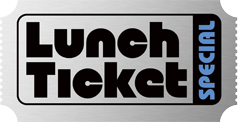Reflections from a Former Editor
by David Bumpus
I’ve always had a deep flaw: I do what I want and what I think will make me happy instead of what is considered wise. Which is how I got where I am: happy as can be as a content marketer in the motorcycle industry, my dream job. Obviously, there was considerable hard work, dedication, and soul-searching along the way, but choosing to pursue a master’s in creative writing at Antioch University Los Angeles and be a part of the university’s literary journal, Lunch Ticket, played a major role in realizing that dream.
Before Antioch, I was stuck in the no-man’s-land of post-college twenty-something life, armed with a bachelor’s degree in mathematics and philosophy but with little job experience besides working as an assistant manager at the local pizza place, security guard, and manual laborer. I couldn’t even secure an entry-level job.
But I knew I loved to write. I knew that telling stories was and had always been important to me above almost everything else, whether that was because telling stories was the easiest way for me to express myself and my thoughts, or because I simply found joy in the act of creation. I knew that if I wanted to do something satisfying with my life, it would have to involve a life of writing. Realistically, I knew I would likely have to be a working writer. I had (and still have) aspirations and/or delusions of writing The New York Times’ Bestselling Great American Novel, but until then I also had to feed myself.
I saw the importance of the work that Lunch Ticket was doing by providing a platform to amplify the voices of the underrepresented, marginalized, and misrepresented. It became immediately clear that if enrolling in this program wasn’t the smartest decision, it was at least the right decision.So, I enrolled in Antioch University Los Angeles’ MFA program in creative writing. I was severely chastised by those around me who thought a STEM degree would be the only employable thing in the economy of the times, but I knew it was the next step on the path I had to follow if I were to remain true to myself. At my first residency, I attended the editor’s presentation on Lunch Ticket. There, I saw the importance of the work that Lunch Ticket was doing by providing a platform to amplify the voices of the underrepresented, marginalized, and misrepresented. It became immediately clear that if enrolling in this program wasn’t the smartest decision, it was at least the right decision.
I put my nose to the grindstone from the first day. I got a part-time job working with Dr. Douglas Sadownick, the founder of the LGBT specialization at Antioch’s masters in psychology department, and a job with Lunch Ticket. For my first issue, I worked as an assistant editor for the poetry and visual art teams, on the newly established Amuse Bouche team, and on the web production and copy-editing teams. My second semester, I continued working with Dr. Sadownick and the LGBT specialization, and was asked to be the editor in chief of Lunch Ticket, both of which I did throughout the rest of my time at Antioch.
I was given a tight word cap for this essay, so I won’t share the ups-and-downs of working on numerous drafts of what turned out not to be The Great American Novel; the tears shed from being emotionally overwhelmed by emails from Lunch Ticket contributors, who were thankful for being given a space to safely share their narratives; or many of the other important experiences I had there. But I can say that being a part of Lunch Ticket and the MFA program at Antioch did much more than improve my writing and give me the experience and skills to ultimately land my dream job: more importantly, it helped me become a better citizen in a world that needs compassion and understanding. In the same stride, it gave me a powerful tool for combating oppression, repression, and injustice: the ability to shape and tell the stories that need to be told. Through storytelling, we can influence the people around us: we can change the way they think, the way they feel, and thus the way they behave. Through storytelling, we can shape the world.

 David Bumpus studied mathematics and philosophy at St. John’s College, and he holds a master’s in creative writing from Antioch University Los Angeles. He was the Editor-in-Chief of Lunch Ticket, and his work has been published in GQ, MAXIM, Cycle World, Motorcyclist, META, The Boston Globe, The Miami Herald, and elsewhere. He currently lives in Southern California with a motorcycle named Zero.
David Bumpus studied mathematics and philosophy at St. John’s College, and he holds a master’s in creative writing from Antioch University Los Angeles. He was the Editor-in-Chief of Lunch Ticket, and his work has been published in GQ, MAXIM, Cycle World, Motorcyclist, META, The Boston Globe, The Miami Herald, and elsewhere. He currently lives in Southern California with a motorcycle named Zero.